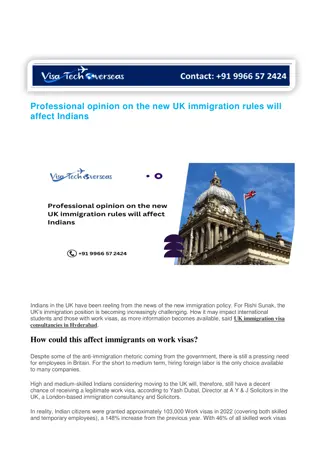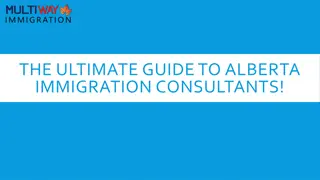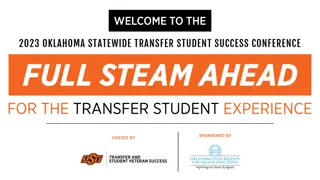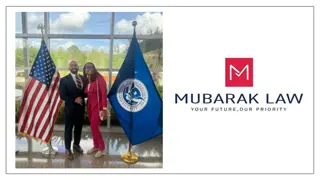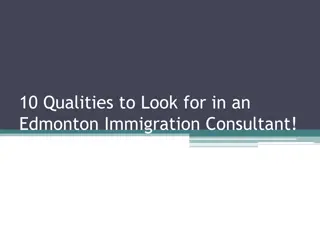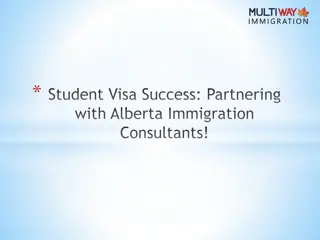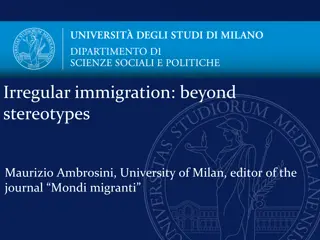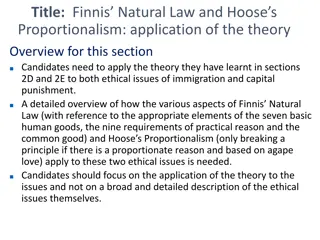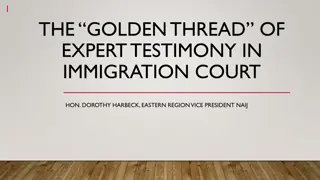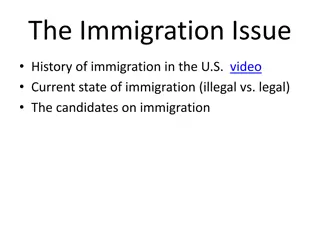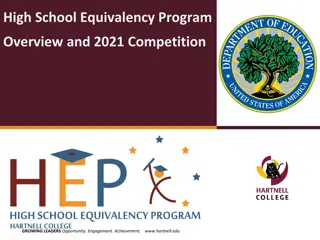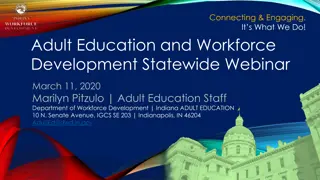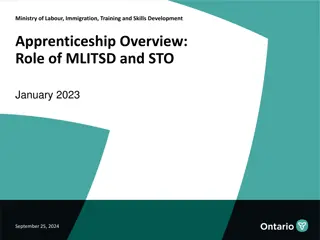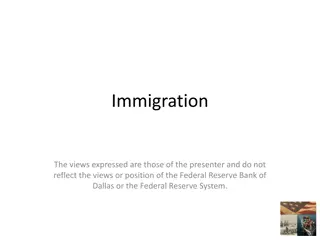Understanding Educational Equivalency for Immigration Purposes
The regulations for EB-2 and EB-3 visas require a minimum of a bachelor's degree, but equivalency assessments differ between H-1B and immigrant visa contexts. Educational credentials must often be evaluated by authoritative sources like EDGE to determine if they meet US degree standards. Non-traditional or foreign degrees may require additional experience for equivalency considerations. It's crucial to understand these nuances for successful visa applications.
Download Presentation

Please find below an Image/Link to download the presentation.
The content on the website is provided AS IS for your information and personal use only. It may not be sold, licensed, or shared on other websites without obtaining consent from the author. Download presentation by click this link. If you encounter any issues during the download, it is possible that the publisher has removed the file from their server.
E N D
Presentation Transcript
Alien Qualifications ILW PERM Workshop
Your Alien is on an H-1B but does he have a Bachelors degree ? While the Regulations for EB-2 at 8 CFR 204.5(k)(2)and EB-3 professional at 8 CFR 204.5 (l)(2) require the minimum of a bachelors degree, the H-1B regulations at 8 CFR 214.2(h)(4)(iii)( C )(4) only require education, specialized training and/or experience that is considered equivalent to a U.S bachelors degree. H-1B regulations at 8 CFR 214.2 (h)(4)(iii)(D) permit five different methods of determining equivalency to a U.S bachelors degree (Including the three years of experience equals one year of undergraduate education rule) but these methods of determining equivalency to bachelors degree are limited to the H- 1B context and are inapplicable to the PERM/I-140 context. Any attempt to use the H-1B equivalency language on a form 9089 is likely to result in a finding by USCIS that the minimum requirements of the position are less than a bachelors degree and a denial of an EB-2 or EB-3 Professional I-140. An educational evaluation based on the H-1B equivalency regulations is unlikely to be recognized in the EB-2, EB-3 professional context.
Educational Evaluators EDGE is an electronic database of foreign degree evaluations maintained by AACRAO (American Association of Collegiate Registrars and Admissions Officers). It is referred to in USCIS and AAO decisions as an authoritative source on educational credential evaluations. Although the AAO and USCIS officially state that they are not bound by EDGE and do not endorse EDGE above any other credible sources regarding equivalency of educational credentials, the decisions made by the Service routinely ignore evaluations that contradict EDGE. It is advisable to check what EDGE says about an alien's educational qualifications through an EDGE based evaluation. Where an alien's educational credentials are not listed in EDGE, an individual educational evaluation may be obtained from AACRAO. As EDGE is routinely updated, it is necessary to check if an evaluation obtained at an earlier point of time remains accurate.
What is an Equivalency? Per 8 CFR 204.4(K)(2) a U.S bachelor's degree or a foreign equivalent degree followed by five years of progressive experience in the specialty shall be considered the equivalent of a Masters degree. In order for an aliens educational credential to be considered to be equivalent to a Bachelor's Degree, it needs to be from a single source and for practical purposes generally be recognized by EDGE to be equivalent to a Bachelor's degree. If EDGE says a foreign credential is comparable to a number of years of education, it will not be considered to be equivalent to a U.S degree by USCIS. Even if EDGE says a foreign credential is equivalent to a U.S degree, it may not considered to be so by the Service if the credential is a certificate or diploma rather than a degree. Degrees issued by non-academic institutions may not be recognised as a degree by USCIS (Example Indian Charted Accountants).
From 3 year Degrees to Masters in Engineering/technology/computer Apps Most foreign three year bachelors degrees are not considered equivalent to a U.S bachelors degree by EDGE as U.S bachelor's degrees take four years to complete. A three year degree may be considered by EDGE to be equivalent to a U.S bachelor's degree if obtained in countries like the U.K that have a 13th year of school (A Levels) or where education is completed prior to university that is eligible for advance college level credit. According to EDGE postgraduate diplomas from India (only if issued at an accredited university or an institution approved by the All India Council for Technical Education) entered after a three year bachelors degree are equivalent to a U.S bachelors degree. Some practitioners report that USCIS appears to be currently recognizing such diplomas as bachelors degrees although they failed to do so in the past. EDGE considers an Indian Bachelor of Engineering (4 Year degree) /Technology to be equivalent a U.S bachelor degree and an Indian Masters of Engineering/technology/computer applications to be equivalent to a U.S masters degree. Additionally, an Indian masters degree of two years duration will be considered equivalent to a U.S bachelors degree if it has been completed after a three year bachelors degree.
Computer & Information research scientists If a doctoral degree is customarily required by the specialty, the alien must have a U.S doctorate or a foreign equivalent degree. 8 CFR 204.5 (k)(2) The Occupational Outlook Handbook states most computer & information research scientists need a PhD in computer science or a related field Will USCIS deny an I-140 filed for a Computer or Information research scientist under EB-2 if the alien does not have a Ph.D., although the certified Form 9089 only requires a masters degree and the alien has a U.S masters degree ?
Combining Education and Experience To qualify under EB-2 advanced degree professional or EB-3 professional the Alien must always possess at the minimum a single source degree (two or more degrees that by themselves are not equivalent to a U.S masters degree cannot be combined to equate to a U.S masters degree but a degree may be considered a Masters degree based on a minimum entry requirement of a prior degree) that is considered to be equivalent to a U.S bachelor's degree. No combination of experience is ever permitted to equate to a bachelor's degree in the I-140 context. Combinations of education, training and experience may be used to qualify under EB-3 skilled worker, as long as the minimum training or experience requirements have an SVP of 2 years and the alien possess such, training and/or experience. - 8 CFR 204.5 (l) (2). Note that general associate degrees have no years of SVP while specialized associate degrees can have up to 2 years of SVP. Combinations of education, training and experience may also be used to qualify under EB-2 as an alien of exceptional ability.
Education equivalency at USCIS vs Alternate requirements at DOL Per 20 CFR 656.17 (h)(4)(i) Alternative experience requirements must be substantially equivalent to the primary requirements. While USCIS regulations at 8 CFR 204.5 (k)(2) provide that a bachelors degree plus five years of progressive work experience is equivalent to a Masters degree, the DOL SVP guidelines do not concur. A masters degree is equal to 4 years of experience (SVP Level 7), while a bachelors plus five years of experience equals 7 years of experience (SVP Level 8). In Matter of Biourja Trading, LLC, 2012- PER-00135 (April 29, 2014) BALCA affirmed the CO's denial as the alternate requirements had different SVP levels (also see Matter of Globalnet Management 2009-PER-110). Do the number of SVP years or the SVP levels of alternate requirements have to be identical for alternate requirements to be considered substantially equivalent?
Training, paid and unpaid experience The regulations do not contain a definition for training. The distinction between education, training and experience is not always clear. While some occupations require apprenticeships or internships such as a residency for physicians, most occupations only require either experience or education and training can often be characterized as experience. Apart from at H-5 there is no place on Form 9089 to include alternate training requirements. Additionally, J.17 and J.22 are the only sections on the Form that refer to an aliens training. The form is not designed to include any specificity about the alien's training and the current practice is to include the alien's training in the sections designed for the alien's experience. See Alien Experience FAQ No. 7. Where a training requirement is contained on Form 9089 USCIS could require evidence in the form of a certificate evidencing the training but where there are issues establishing employment for an unpaid position, categorizing the experience as training may be a strategy. Be prepared to explain to USCIS why it is not feasible to train a particular applicant on the job.
Experience, education or training gained with the employer Per 20 CFR 656.17 (i) (3)(i)An employer cannot require U.S applicants to possess training/experience not possessed by the alien worker at the time of initial hire by the employer, unless the alien either gathered the experience/training with the employer in positions where the job duties were 50% different from the position certification is being sought for or it is no longer feasible to train a worker to qualify for the position. Per 20 CFR 656.17 (I)(4) Where an alien is currently employed by the employer DOL will not consider any education or training obtained by a beneficiary at the employer's expense unless the employer offers similar training to U.S applicants.
Kellogg Language. 20 CFR 656.17 (h)(4)(ii) states that where an alien who is already employed by the employer, qualifies for a position only by virtue of the employer's alternative requirements, certification will be denied unless the application states that "any suitable combination of education, training, or experience is acceptable"- (Known as the Kellogg or magic language). In Matter of Federal Insurance Co., 2008-PER-00037 (Feb. 20, 2009), BALCA stated that certification could not be denied for failure to include the language on the form as the form lacked a specific place to add the language and DOL's instructions to AILA to add it to Box 14. is not readily available to the public. Inclusion of the Kellogg language invites further scrutiny by DOL of the qualifications of applicants rejected by the employer whom do not hold the minimum requirements as stated on the Form 9089. However as DOL is not required by statute or regulations to follow BALCA decisions it would be safest to add the language to box 14 where ever the regulations require it, while leaving it out where not required.
Certifications and Licenses The employer should list separately in section K of the form 9089 all qualifications of an alien, such as certificates, licenses, professional course work or other credentials that meet the requirements to perform the position described in Section H - See Alien Experience FAQ No. 8





